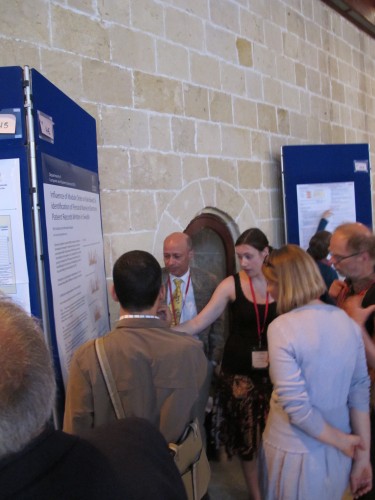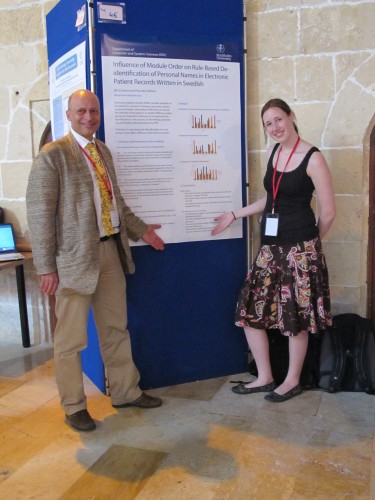The project proposal which Paul, Martin, Birger and myself submitted to the Swedish Research Council (Vetenskapsrådet) this year can be found here (VR10-main.pdf). It is an improvement from our proposal from last year. The objective is to research on the integration of Business Process Management Systems (BPMSs) with social software (SoS).
Geog Hodosi’s Licentiate seminar
On May 27, 2010 our colleague Georg Hodosi has defended successfully his Licentiate Thesis named: “A Method for Decision Support in Information Technology Outsourcing: The Case for Large Swedish Companies”.
On behalf on our research group in IT Management I would like to congratulate Georg and to wish him “Good luck and success towards PhD”. Last but not the least I would like to thanks to all the participants in this seminar.
An abstract of Georg’s licentiate thesis and a picture from the seminar is following below.
Abstract
Information technology outsourcing (ITO) is a growing area. However, not all ITO experiences have been positive, as they have not delivered the cost savings or the expected IT service quality. From this perspective, a method for assessing the risk exposure (RE) in ITO would be a valuable support for IT decision makers from any large company in Sweden that plans to outsource IT. This thesis proposes a novel method for ITO.
The development of the method is based on transaction cost theory (TCT) and risk exposure (RE) and supports IT decision makers in deciding whether to outsource IT or not. The method developed in this research has been implemented in an ITO tool and has been evaluated during the last three years in two large Swedish companies with more than twenty years’ experience of ITO. Moreover, the method developed has been extended with different practices from areas like procurement, contracting and project management based on the professional experience of the author in these areas from a large Swedish company (other than the two included in this research). The main contribution of the thesis consists of a method for assessing the risk exposure in ITO, which can support IT decision makers in determining whether to outsource IT or not. Furthermore, the thesis proposes recommendations for how to reduce the risk exposure in the IT processes intended to be outsourced.

Two papers accepted at IceTAL 2010
7th International Conference on Natural Language Processing. Published by Springer.
Eriks Sneiders. Automated Email Answering by Text Pattern Matching.
Abstract. Answering email by standard answers is a common practice at contact centers. Our research assists this process by creating reply messages that contain one or several standard answers. Our standard answers are linked to representative text patterns that match incoming messages. The system works in three languages. The performance was evaluated on two email sets; the main advantage of our email answering technique is good correctness of the delivered replies.
Hercules Dalianis, Magnus Rosell, Eriks Sneiders. Clustering E-Mails for the Swedish Social Insurance Agency? What Part of the E-Mail Thread Gives the Best Quality?
Abstract. We need to analyze a large amount of emails sent to a customer service of a governmental organization based in Sweden from citizens. To carry out this analysis we need to cluster a large number of emails with the aim of automatic email answering. The research problem is whether we should use the whole email including the thread or just the original query for the clustering. We have in this paper described the experiments to find out this. Our results shows that only the query and the answering part should be used, but not necessarily the whole email thread. Our normalized mutual information (NMI) for the query and answering part is 0.12 higher than for only the query.
Two papers accepted at IceTAL 2010
7th International Conference on Natural Language Processing. Published by Springer.
Eriks Sneiders. Automated Email Answering by Text Pattern Matching.
Abstract. Answering email by standard answers is a common practice at contact centers. Our research assists this process by creating reply messages that contain one or several standard answers. Our standard answers are linked to representative text patterns that match incoming messages. The system works in three languages. The performance was evaluated on two email sets; the main advantage of our email answering technique is good correctness of the delivered replies.
Hercules Dalianis, Magnus Rosell, Eriks Sneiders. Clustering E-Mails for the Swedish Social Insurance Agency? What Part of the E-Mail Thread Gives the Best Quality?
Abstract. We need to analyze a large amount of emails sent to a customer service of a governmental organization based in Sweden from citizens. To carry out this analysis we need to cluster a large number of emails with the aim of automatic email answering. The research problem is whether we should use the whole email including the thread or just the original query for the clustering. We have in this paper described the experiments to find out this. Our results shows that only the query and the answering part should be used, but not necessarily the whole email thread. Our normalized mutual information (NMI) for the query and answering part is 0.12 higher than for only the query.
Accepted paper "Multiple Help Online: An Integrated E-Health System for Stress Management"
Hélène Sandmark at the School of Health and Medical Sciences, Örebro University, and I have got a conference paper accepted at IADIS e-Health 2010. The conference is to be held in Freiburg, Germany, in late July. The paper is entitled “Multiple Help Online: An Integrated E-Health System for Stress Management”. Please see the paper abstract below.
In
working life of today, people experience high levels of stress and often react
strongly to different stressors. If one is exposed to high stress levels for a
long time, this may eventually lead to sickness and absence from work. Web
based systems are available today for people who suffer from stress. However,
these web based systems need to be further explored in order to meet different
‘on demand needs’ of people in stress. In order to offer people in stress a
broad palette of help and support, different forms of online help from both
health experts, peers and published material and exercise programs need to be
well integrated in the web based system. A system that offers multiple help online
can also let the users experience complemented advice and ideas regarding their
stress concerns. The web based stress management system proposed in this paper
outlines a combination of online interactions between health experts and people
in stress, community conversations among peers and published information and
exercises. The paper also introduces a set of design principles to be used to
guide the development of integrated online help for stress management.
Report from the LREC conference in Malta the 19th to 21st of May
Hercules Dalianis, Sumithra Velupillai and me (Elin Carlsson) participated in the the seventh international conference on Language Resources and Evaluation (LREC) that was held in Valletta, Malta 19-21 May 2010. The conference had approximately 1200 participants and about 600 out of 900 submissions were accepted.
We presented three different posters: Creating a Reusable English-Chinese Parallel Corpus for Bilingual Dictionary Construction; How Certain are Clinical Assessments? Annotating Swedish Clinical Text for (Un)certainties, Speculations and Negations; and Influence of Module Order on Rule-Based De-identification of Personal Names in Electronic Patient Records Written in Swedish. I attach our report from the conference (written in Swedish): LREC2010_notes_and_reflections.pdf
Sumithra and Hercules present their poster: How Certain are Clinical Assessments? Annotating Swedish Clinical Text for (Un)certainties, Speculations and Negations
Elin and Hercules present their poster: Influence of Module Order on Rule-Based De-identification of Personal Names in Electronic Patient Records
Written in Swedish.
Hercules and Elin after the poster session.
Microsoft Research Event – Enabling Innovation through Research
On the 5th of May, 2010, I visited Microsoft research lab in Cambridge, outside London, for their event on Enabling Innovation through Research. Microsoft Research Cambridge is one of six Microsoft research labs in the world. The event was introduced by a keynote speech given by Andrew Herbert, the managing director of the lab. It showed that they have a wide range of research areas spanning from disease modeling and advertisements to inference and cloud computing. The lunch break that followed combined eating, chatting and walking around among product solutions from different research projects. The researchers were present and they gave us the opportunity to engage in nice discussions on the different solutions and their future plans. There were examples of interactive systems for medical images and body part recognition, painting and auto photo collage tools, for example.
For more information about the research event, please visit:
http://research.microsoft.com/en-us/um/cambridge/events/eitr/
In addition, Microsoft Research arranges summer schools for PhD students, and they also have PhD Scholarship Programmes and Research Fellowships. Supervisors of PhD students are welcome to nominate projects and PhD students for the summer schools and PhD scholarship programmes.
More general information can be found at: http://research.microsoft.com/en-us/labs/cambridge/default.aspx
The agenda of this year’s summer school can be seen at:
http://research.microsoft.com/en-us/events/2010summerschool/

Nils Stadling, Microsoft, and I, at Microsoft Research Cambridge
Paper on Problem Management accepted to WISEMP at CP2010
Despite of Eyjafjallajökull, and cancelled flights all over Europe last week, I was able to attend the CP2010 conference in Montréal, Canada and present the paper: “Mapping CM3: Emergency Problem Management on an Industrial Emergency and Crisis Management Process“. The paper was accepted to the Industrial Software Evolution and Maintenance Processes (WISEMP ’10) of the Computing Proffesionals conference (CP2010). The paper was a joint effort by Dr. Mira Kajko-Mattson, Emil Hammargren and me, Joakim Snygg.
Management is often a bigger issue than technical in software maintenance, and when dealing with critical software – especially when time is of essence – the efficiency of the process is a determinant of its success. Our paper describes a model on software problem management during emergencies, and how this model relates to contingency planning and crisis management within the industry.


